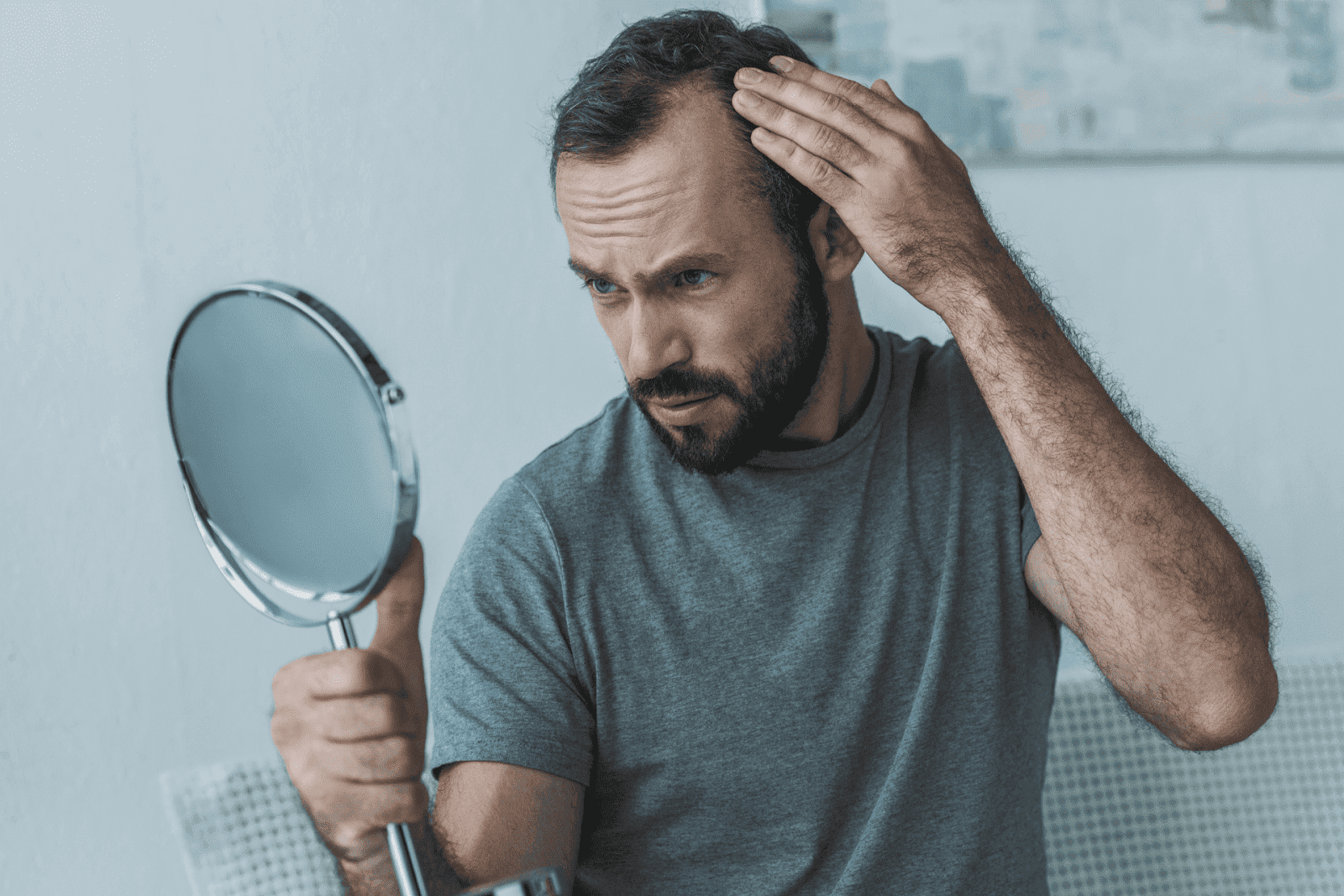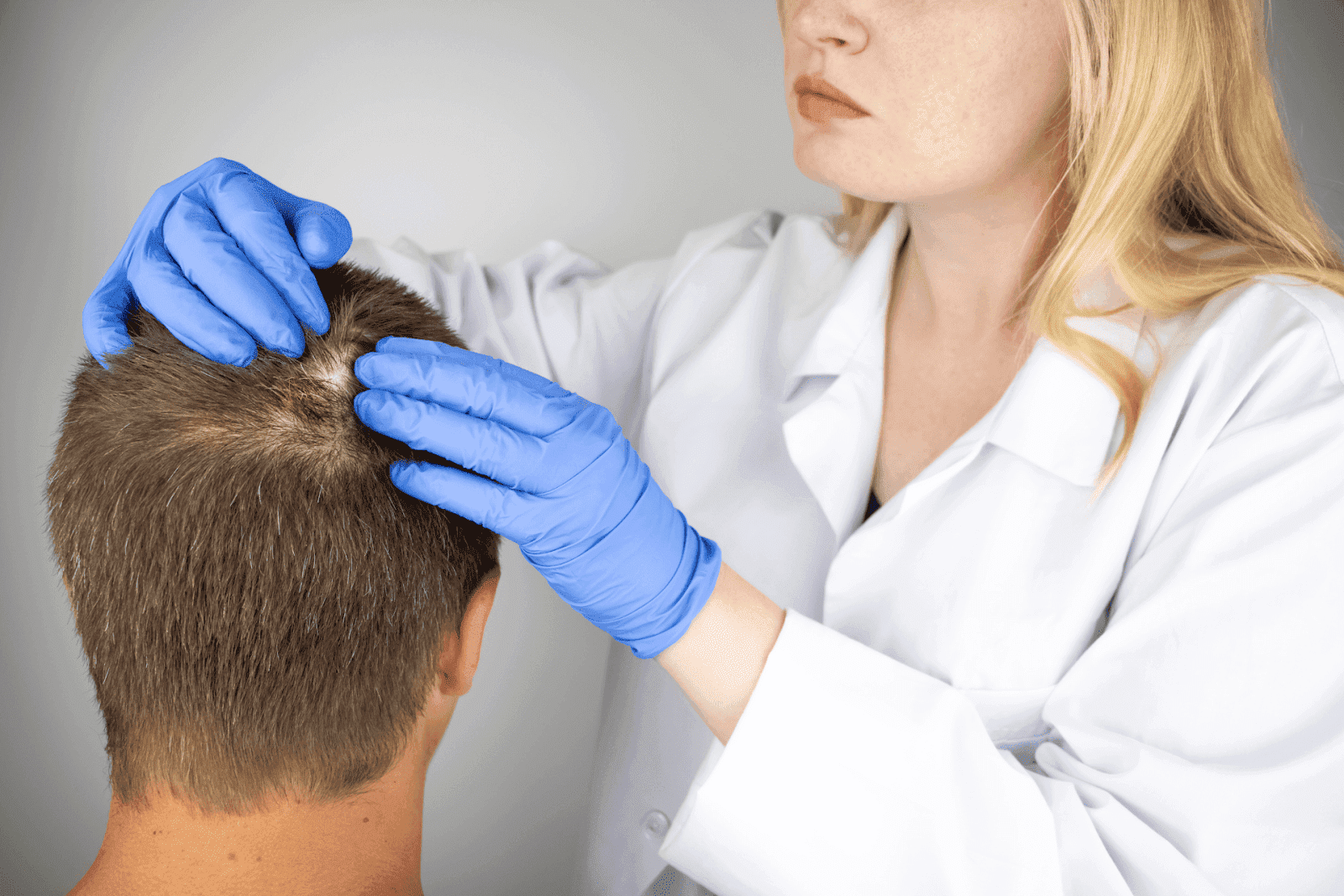How to Stop Alopecia Areata From Getting Worse
Alopecia areata is a challenging autoimmune condition that causes hair loss, often in small, round patches on the scalp and other areas of the body. While it can be [...]
Read More
Medically reviewed by Alan Lucks | MD, Alan Lucks MDPC Private Practice - New York on October 14th, 2025.
Alopecia areata is an autoimmune condition where the immune system attacks hair follicles, causing patchy hair loss that can progress to total scalp (alopecia totalis) or body hair loss (alopecia universalis) in 5-10% of cases.
Early intervention with intralesional corticosteroid injections (triamcinolone 5-10mg/mL) every 4-6 weeks is the most effective first-line treatment, with 60-70% showing regrowth within 4 months.
Topical immunotherapy with diphenylcyclopropenone (DPCP) or squaric acid dibutylester induces allergic contact dermatitis that can redirect immune activity away from hair follicles.
JAK inhibitors (baricitinib, ritlecitinib) represent a breakthrough—FDA-approved for severe cases, they block inflammatory signaling and achieve significant regrowth in 35-40% of patients with extensive disease.
Stress management matters: psychological stress can trigger flares, and studies show mindfulness-based interventions and cognitive behavioral therapy reduce recurrence rates and improve treatment response.
Alopecia areata is a challenging autoimmune condition that causes hair loss, often in small, round patches on the scalp and other areas of the body. While it can be distressing to experience sudden hair loss, understanding how to manage the condition effectively can help prevent it from worsening and improve overall outcomes. This article explores practical strategies, medical insights, and the latest innovations in care to help you take control of alopecia areata.
Alopecia areata occurs when the immune system mistakenly attacks hair follicles, leading to hair loss. The severity and progression vary widely among individuals. Some people experience small patches that regrow hair naturally, while others may face more extensive hair loss, including alopecia totalis (complete scalp hair loss) or alopecia universalis (loss of all body hair). The unpredictability of this condition can be distressing, as individuals may find themselves navigating a fluctuating landscape of hair regrowth and loss, often without clear explanations or timelines.
Recognizing the signs early and responding promptly is crucial to preventing the condition from worsening. Hair loss that spreads rapidly or affects larger areas may require immediate medical attention to halt progression and improve chances of regrowth. Additionally, understanding the psychological impact of alopecia areata is vital. Many individuals experience anxiety, depression, or a diminished sense of self-esteem due to their changing appearance, making support from mental health professionals or support groups an important aspect of comprehensive care.
 Common Triggers and Risk Factors
Common Triggers and Risk FactorsWhile the exact cause of alopecia areata is not fully understood, several factors can contribute to its onset or exacerbation. These include genetic predisposition, stress, infections, and other autoimmune disorders. Identifying and managing these triggers can help reduce flare-ups and disease progression. For instance, individuals with a family history of autoimmune diseases may be at a higher risk, suggesting a genetic link that warrants further investigation. Stress management techniques, such as mindfulness, yoga, or therapy, can also play a significant role in mitigating the effects of stress on the immune system, potentially reducing the frequency of flare-ups.
Early diagnosis and treatment are key to controlling alopecia areata. The hair follicles remain alive during the active phase, so timely intervention can promote regrowth and minimize permanent damage. Delaying treatment may allow the immune attack to intensify, leading to more extensive hair loss. Various treatment options are available, ranging from topical corticosteroids to more advanced therapies like immunotherapy, which aims to retrain the immune system. Patients should engage in open discussions with their healthcare providers to explore the most suitable treatment plans tailored to their specific needs and circumstances. Furthermore, staying informed about ongoing research and emerging therapies can empower individuals to make proactive decisions regarding their health and treatment options.
There is no one-size-fits-all cure for alopecia areata, but several treatments have proven effective in managing symptoms and preventing progression. Consulting a healthcare professional who specializes in hair loss is essential to developing a personalized treatment plan.
Corticosteroids are often the first line of treatment. Applied topically or injected directly into affected areas, they reduce inflammation and suppress the immune response attacking hair follicles. This can help stop hair loss and encourage regrowth.
However, corticosteroids require medical supervision due to potential side effects, especially with long-term use. A dermatologist or telehealth provider can guide appropriate dosing and monitor progress. It's also important for patients to understand the balance between managing their condition and the risks associated with steroid use, as prolonged exposure can lead to skin thinning and other systemic issues.
For more severe or resistant cases, treatments like topical immunotherapy, which involves applying chemicals to provoke an allergic reaction, may help reset the immune system. Other options include minoxidil, JAK inhibitors, and systemic corticosteroids, each with varying degrees of success and side effects.
Because alopecia areata is complex, ongoing research continues to explore new therapies. Staying informed about emerging treatments can provide hope and additional options for managing the condition. For instance, recent studies have highlighted the potential of biologic drugs that target specific pathways in the immune response, offering a more tailored approach to treatment. Additionally, lifestyle factors such as stress management and nutritional support are increasingly recognized for their roles in hair health, prompting some practitioners to recommend complementary therapies alongside conventional treatments.
Alongside medical treatments, lifestyle adjustments can support hair health and potentially slow alopecia areata progression. These strategies focus on reducing triggers, protecting hair, and maintaining overall well-being.
Stress is a known trigger that can worsen autoimmune conditions, including alopecia areata. Incorporating stress management practices such as meditation, yoga, deep breathing exercises, or counseling can help stabilize the immune system and reduce flare-ups. Engaging in regular physical activity, such as walking or swimming, can also serve as a powerful tool for stress relief, as it releases endorphins that promote a sense of well-being. Additionally, establishing a routine that includes time for hobbies or relaxation can create a buffer against daily stressors, allowing for a more balanced emotional state.
Using mild shampoos, avoiding harsh chemicals, minimizing heat styling, and protecting hair from excessive sun exposure can prevent additional damage to vulnerable hair follicles. Gentle handling of hair also reduces breakage and irritation. Consider incorporating natural oils, such as coconut or argan oil, into your hair care routine; these can provide nourishment and hydration while also acting as a protective barrier against environmental stressors. Furthermore, using a wide-toothed comb or a soft-bristle brush can help minimize tugging and pulling, which is particularly important for those experiencing thinning hair.
While no specific diet cures alopecia areata, maintaining a balanced diet rich in vitamins and minerals supports overall hair health. Nutrients like biotin, zinc, iron, and vitamins D and E are particularly important. Consulting a healthcare provider before starting supplements ensures safe and effective use. Additionally, incorporating foods such as leafy greens, nuts, seeds, and fatty fish can enhance nutrient intake, as these foods are rich in antioxidants and omega-3 fatty acids that promote scalp health. Staying hydrated is equally crucial; drinking plenty of water helps maintain optimal bodily functions and can contribute to healthier hair growth.
Access to expert care is vital for managing alopecia areata effectively. Telehealth services have revolutionized how patients connect with healthcare providers, offering convenience, affordability, and timely support.
Telehealth platforms provide easy access to dermatologists and primary care providers without the need for in-person visits. This is especially beneficial for those living in remote areas or with busy schedules. Patients can receive diagnosis, treatment recommendations, and follow-up care from the comfort of their home.
One of the leading telehealth services is Doctronic.ai, an innovative platform that combines artificial intelligence with expert medical care. Doctronic offers free AI doctor visits to anyone through their website, providing rapid and comprehensive answers based on the latest peer-reviewed medical research.
With over 10 million users, Doctronic's AI doctor remembers your medical history, offering personalized advice and treatment options tailored to your unique needs. For alopecia areata patients, this means quick access to reliable information and the ability to consult with licensed doctors via affordable telehealth video visits, available 24/7 across all 50 states.
Using Doctronic.ai can help you monitor your condition closely, adjust treatments promptly, and prevent alopecia areata from worsening by staying connected with healthcare professionals who understand your situation.
While alopecia areata is often manageable, certain situations require urgent medical evaluation. Rapidly spreading hair loss, involvement of eyebrows or eyelashes, or signs of infection at affected sites should prompt consultation with a healthcare provider.
Additionally, if hair loss is accompanied by other symptoms such as fatigue, joint pain, or skin changes, it may indicate a broader autoimmune or systemic condition that needs comprehensive assessment.
 Taking Control of Alopecia Areata
Taking Control of Alopecia AreataLiving with alopecia areata can be challenging, but understanding how to stop it from getting worse empowers you to take proactive steps. Early diagnosis, effective medical treatments, lifestyle adjustments, and leveraging modern telehealth services like Doctronic.ai provide a comprehensive approach to managing this condition.
By staying informed and connected with healthcare providers, you can improve your chances of hair regrowth and maintain confidence in your appearance. Remember, alopecia areata is a medical condition that deserves expert care and compassionate support every step of the way.
Don't let alopecia areata dictate your life. Take the first step towards a smarter, faster, and more personal healthcare experience with Doctronic. Our AI-powered platform offers free, immediate medical insights and personalized care, ensuring you're not just another patient, but a valued individual with unique needs. With over 10 million satisfied users, Doctronic is the leading AI Doctor, providing quality care based on the latest medical research. Ready to revolutionize the way you manage alopecia areata? Skip the line. Talk to an AI Doctor Now, for free.
While there's no cure, early aggressive treatment and avoiding known triggers like severe stress can significantly slow progression and promote regrowth. Doctronic can help evaluate your hair loss pattern and recommend appropriate treatment options.
Alopecia areata is a challenging autoimmune condition that causes hair loss, often in small, round patches on the scalp and other areas of the body. While it can be [...]
Read More